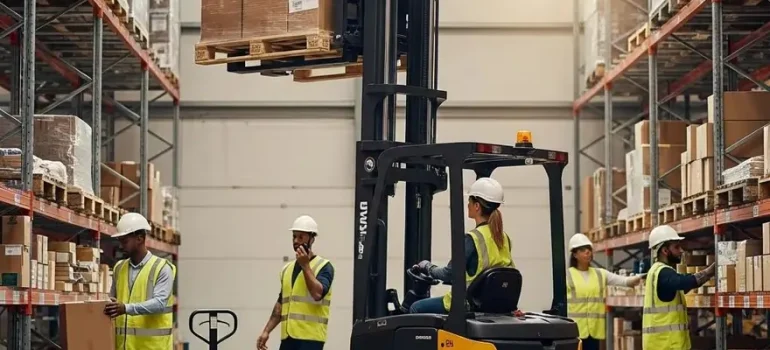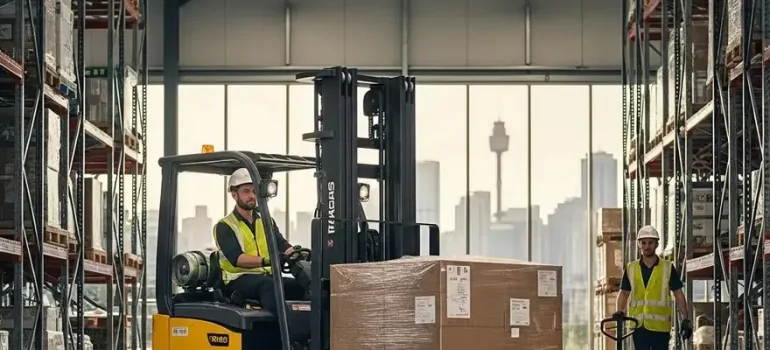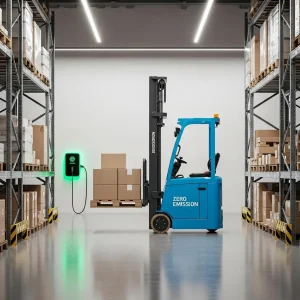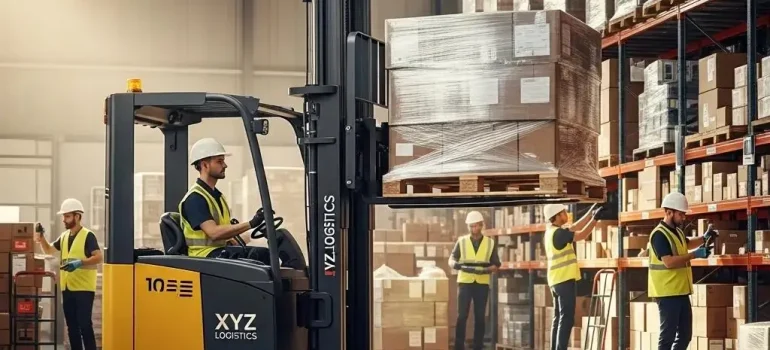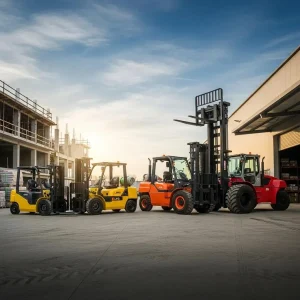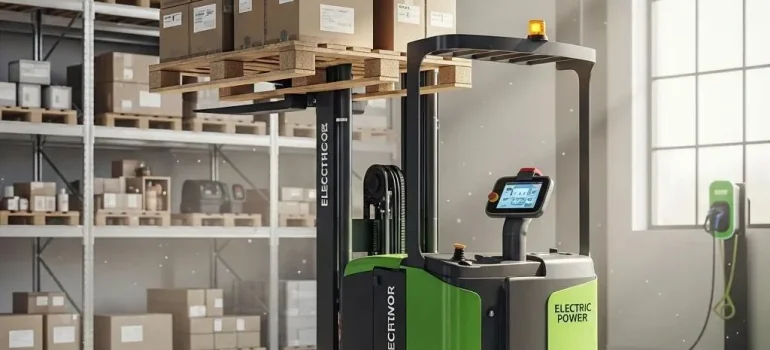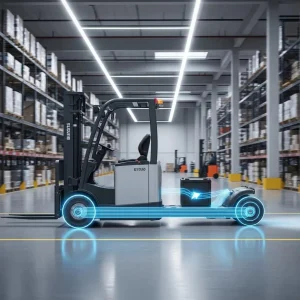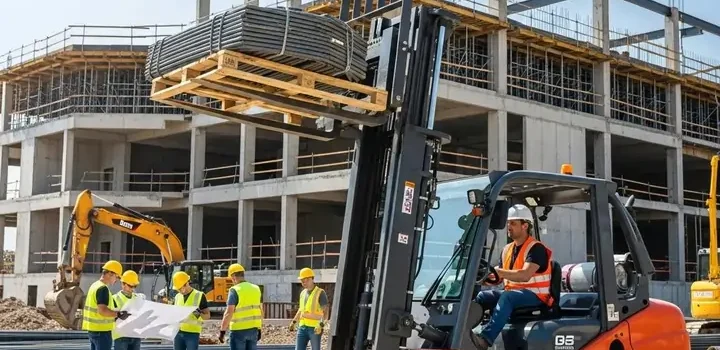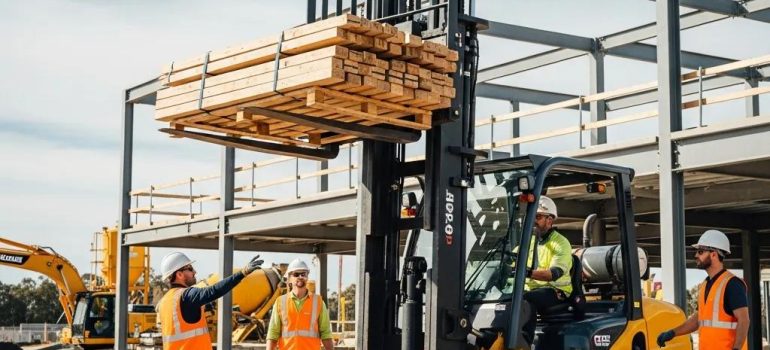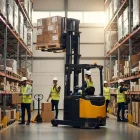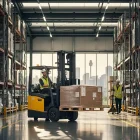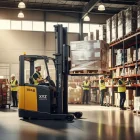Affordable Forklift Hire Options in Australia: Save Money with Cost-Effective Rental Solutions
In the competitive landscape of material handling, businesses are constantly seeking ways to optimise their operations while managing costs. Affordable forklift hire options present a viable solution, allowing companies to access essential equipment without the hefty price tag associated with purchasing. This article will explore the various cost benefits of forklift hire, the types of forklifts available, and how businesses can find the best rental options in Australia. By understanding the financial advantages and operational flexibility that come with forklift rental, companies can make informed decisions that enhance productivity and reduce overhead costs.
Academic insights further emphasise that the substantial financial outlay for essential equipment presents a significant hurdle for many businesses.
Overcoming High Forklift Purchase Costs with Rental
Affordable forklift hire plays a vital role in helping businesses manage operational costs while maintaining efficiency. The utilisation of equipment like lifting scissors, hand stackers, and forklifts is crucial for the safe and smooth movement of raw materials, finished products, and heavy cargo within these facilities. Nevertheless, the substantial financial outlay for purchasing such equipment presents a significant hurdle for businesses in this industry.
Human Capital Strategy Implementation for Business Plan at Material Handling Rental Services Startup LogisMe, R Indradewa, 2024
The financial burden of acquiring essential equipment is a common challenge for businesses, making rental solutions particularly appealing.
Forklift Rental: Overcoming High Equipment Purchase Costs
The utilisation of equipment like lifting scissors, hand stackers, and forklifts is crucial for the safe and smooth movement of raw materials, finished products, and heavy cargo within these facilities. Nevertheless, the substantial financial outlay for such equipment presents a significant hurdle for businesses in this industry.
Human Capital Strategy Implementation for Business Plan at Material Handling Rental Services Startup LogisMe, R Indradewa, 2024
Indeed, the significant financial investment required for material handling equipment is a common challenge for businesses, making rental an attractive alternative.
Forklift Rental: Overcoming Equipment Financial Hurdles
Efficient logistics and warehousing operations heavily rely on effective material handling and cleaning processes. The utilisation of equipment like lifting scissors, hand stackers, and forklifts is crucial for the safe and smooth movement of raw materials, finished products, and heavy cargo within these facilities. Nevertheless, the substantial financial outlay for such equipment presents a significant hurdle for businesses in this industry
Human Capital Strategy Implementation for Business Plan at Material Handling Rental Services Startup LogisMe, R Indradewa, 2024
The discussion will cover the cost benefits of hiring versus buying, the different types of forklifts available for hire, and the comparison of short-term and long-term hire rates. Additionally, we will highlight what makes Active Forklift’s hire services a competitive value in Australia, and how businesses can find affordable options in major cities.
What Are the Cost Benefits of Forklift Hire Compared to Buying?
Forklift Hire in Parramatta offers significant financial advantages over purchasing equipment outright. By opting for rental, businesses can avoid the substantial capital outlay required for buying forklifts, which often includes not just the purchase price but also maintenance and storage costs. This flexibility allows companies to allocate their resources more efficiently, investing in other critical areas of their operations.
The decision to acquire equipment, whether through purchase or rental, involves a comprehensive analysis of various financial and operational factors.
Equipment Acquisition: Purchase vs. Rental Cost Analysis
Purchasing with cash, financing through a loan, renting and leasing are four most common ways which are mainly affected by different construction equipment selection factors. For having the best result in profit for a construction industry choosing the best alternative for obtaining equipment is one of the most important issues. The optimum acquisition strategy comes from accurate estimates of revenues and cost and also some non-financial factors that affect the selection of appropriate equipment.
Decision Making for Purchase/
Rental of Road Construction Equipment Based on Productivity and Owning & Operating Cost, P Gohil, 2019
Academic studies delve into the complexities of equipment procurement, often comparing the long-term implications of purchasing versus renting.
Product Service Systems: Rental vs. Purchase Decisions
The objective of this study is to construct a renting system in a reverse logistics environment on the basis of the PSS theory: this system includes the complete management of product examination, maintenance, upgrading, products recycling, and final waste disposal. Due to the different procurement processes of PSS, the following two product operations are analysed: (1) procurement of new products and (2) rental of products.
Simulation of purchase or rental decision-making based on product service system, TC Kuo, 2011
Academic research further supports the strategic decision-making process between purchasing and renting equipment, often exploring the long-term implications of each choice.
Simulating Purchase vs. Rental Decisions for Equipment
The objective of this study is to construct a renting system in a reverse logistics environment on the basis of the PSS theory: this system includes the complete management of product examination, maintenance, upgrading, product recycling, and final waste disposal. Due to the different procurement processes of PSS, the following two product operations are analysed: (1) procurement of new products and (2) rental of products.
Simulation of purchase or rental decision-making based on product service system, TC Kuo, 2011
How Does Forklift Hire Reduce Capital Outlay and Maintenance Costs?
When businesses choose to hire forklifts, they significantly reduce their initial investment. The capital that would have been tied up in purchasing equipment can instead be used for other operational needs. Additionally, rental agreements often include maintenance services, which further lowers ongoing costs. This arrangement ensures that businesses are not burdened with unexpected repair expenses, allowing for better financial planning.
Indeed, a key benefit of rental agreements is the strategic outsourcing of maintenance, which contributes significantly to long-term cost reduction.
Forklift Rental: Maintenance Cost Reduction Strategy
Long term cost reduction requires a systematic approach to maintenance. In a production plant the increased level of service can be achieved by outsourcing maintenance (ie, the rental company does maintenance on them and includes that cost in the rental fee). This allows the plant to focus on its core business and avoid the overhead of maintaining a maintenance department.
The handbook of maintenance management, 2009
What Operational Flexibility Does Forklift Rental Provide for Businesses?
Forklift rental services in Sydney provide businesses with the operational flexibility to scale their equipment needs according to demand. For instance, during peak seasons, companies can hire additional forklifts to meet increased workload without the long-term commitment of purchasing. This adaptability is crucial for businesses that experience fluctuating demand, enabling them to respond quickly to market changes.
Which Forklift Types Are Available for Hire to Suit Different Needs?
The variety of forklifts available for hire caters to diverse operational requirements. Understanding the specific advantages of each type can help businesses select the most suitable equipment for their needs.
Indeed, choosing the right forklift is paramount for maximising efficiency and ensuring the safe handling of materials across various industries.
Optimal Forklift Selection for Material Handling Efficiency
In material handling, warehousing, manufacturing and construction applications, forklifts are vital equipment, which are used to engage, lift and move palletised items. So, selection of the most appropriate forklift is an essential task for transportation of materials in warehouses for optimal use of the equipment.
Selection of Forklift unit for transport handling using integrated MCDM under neutrosophic environment, AK Saha, 2024
What Are the Advantages of Electric Forklift Hire for Warehouses?
Electric Forklift Hire in Sydney is particularly advantageous for warehouse operations due to their zero emissions at the point of use and lower operational costs. They are quieter than their diesel counterparts, making them ideal for indoor use where noise reduction is a priority. Additionally, electric forklifts often require less maintenance, further enhancing their cost-effectiveness over time.
When Should You Choose Diesel, LPG, or All-Terrain Forklifts for Hire?
Choosing the right type of forklift depends on the specific application. Diesel forklifts are best suited for outdoor use and heavy-duty tasks, while LPG forklifts offer a balance between power and efficiency, making them versatile for both indoor and outdoor environments. All-terrain forklifts are designed for rugged surfaces, providing the necessary traction and stability for construction sites or uneven ground.
How Do Short-Term and Long-Term Forklift Hire Rates Compare in Australia?
Understanding the differences between short-term and long-term hire rates is essential for businesses looking to optimise their rental costs.
What Factors Influence Forklift Rental Prices Across Different Durations?
Rental prices can vary based on several factors, including the type of forklift, the duration of the hire, and market demand. Generally, short-term rentals have higher daily rates, while long-term hires often come with discounted weekly or monthly rates. Businesses should assess their operational needs to determine the most cost-effective rental duration.
How Can Long-Term Hire Save Money with Lower Weekly Rates and Included Maintenance?
Long-term hire agreements typically offer lower weekly rates compared to short-term rentals. Additionally, many long-term contracts include maintenance services, which can lead to significant savings over time. By committing to a longer rental period, businesses can ensure they have the necessary equipment while minimising overall costs.
What Makes Active Forklift’s Hire Services a Competitive Value in Australia?
Active Forklift stands out in the market for its competitive pricing and comprehensive service offerings. The company’s commitment to transparency and customer satisfaction makes it a reliable choice for many businesses.
How Does Active Forklift Ensure Competitive and Transparent Pricing?
Active Forklift employs a straightforward pricing model that eliminates hidden fees, allowing customers to understand their rental costs upfront. This transparency fosters trust and helps businesses budget effectively for their material handling needs.
What Tailored Solutions and Expert Guidance Does Active Forklift Offer?
Active Forklift provides tailored solutions to meet the unique requirements of each client. Their team of experts offers guidance on selecting the right forklift for specific applications, ensuring that businesses receive the most suitable equipment for their operations.
How Can Businesses Find Affordable Forklift Hire Options in Major Australian Cities?
Finding affordable forklift hire options is crucial for businesses operating in major cities. Understanding local market conditions can help companies secure the best deals.
What Are the Local Forklift Hire Rates and Availability in Sydney and Melbourne?
In Sydney and Melbourne, forklift hire rates vary based on demand, forklift type, and availability. Businesses should conduct market research to compare rates and ensure they are getting the best value for their rental needs. Engaging with local suppliers can also provide insights into current market trends and pricing.
How Does Active Forklift Support Regional Areas Like Brisbane, Perth, and Adelaide?
Active Forklift Australia (A KION Company) extends its services to regional areas, ensuring that businesses in Brisbane, Perth, and Adelaide have access to quality forklift hire options. This commitment to regional support helps bridge the gap for companies that may otherwise struggle to find reliable equipment rental services.
What Are Common Questions About Forklift Hire Costs and Services?
Understanding the costs and services associated with forklift hire can help businesses make informed decisions.
How Much Does It Cost to Hire a Forklift Per Week in Australia?
The cost of hiring a forklift in Australia typically ranges from approximately $250 to $1,200 per week, depending on the type of forklift, rental duration, and additional services. Factors such as maintenance, insurance, and delivery can also influence the overall cost.
Why Should Businesses Choose Forklift Hire Over Purchase?
Choosing forklift hire over purchase allows businesses to conserve capital, reduce maintenance responsibilities, and maintain operational flexibility. This approach is particularly beneficial for companies that require equipment for short-term projects or those that experience fluctuating demand.

